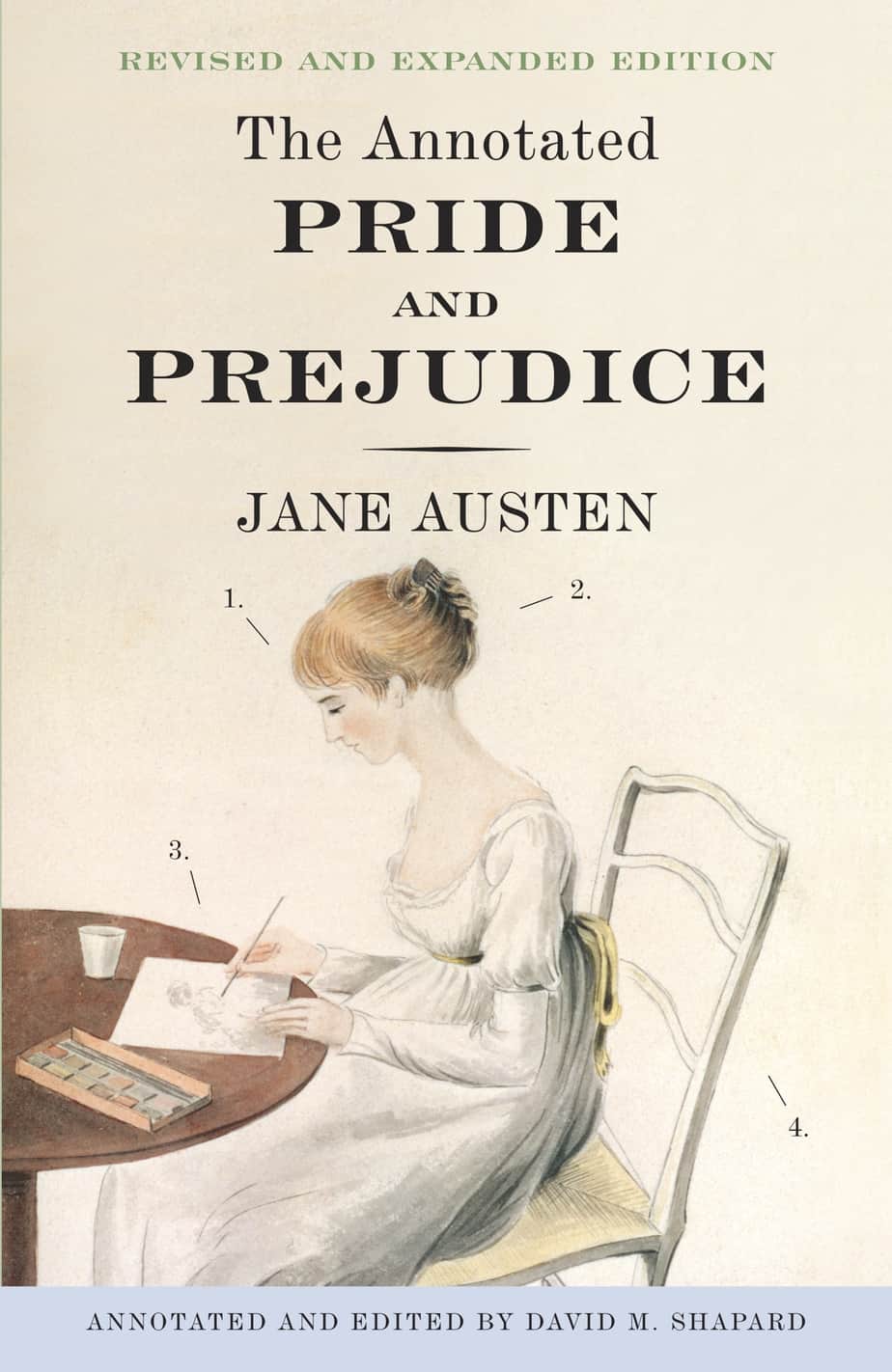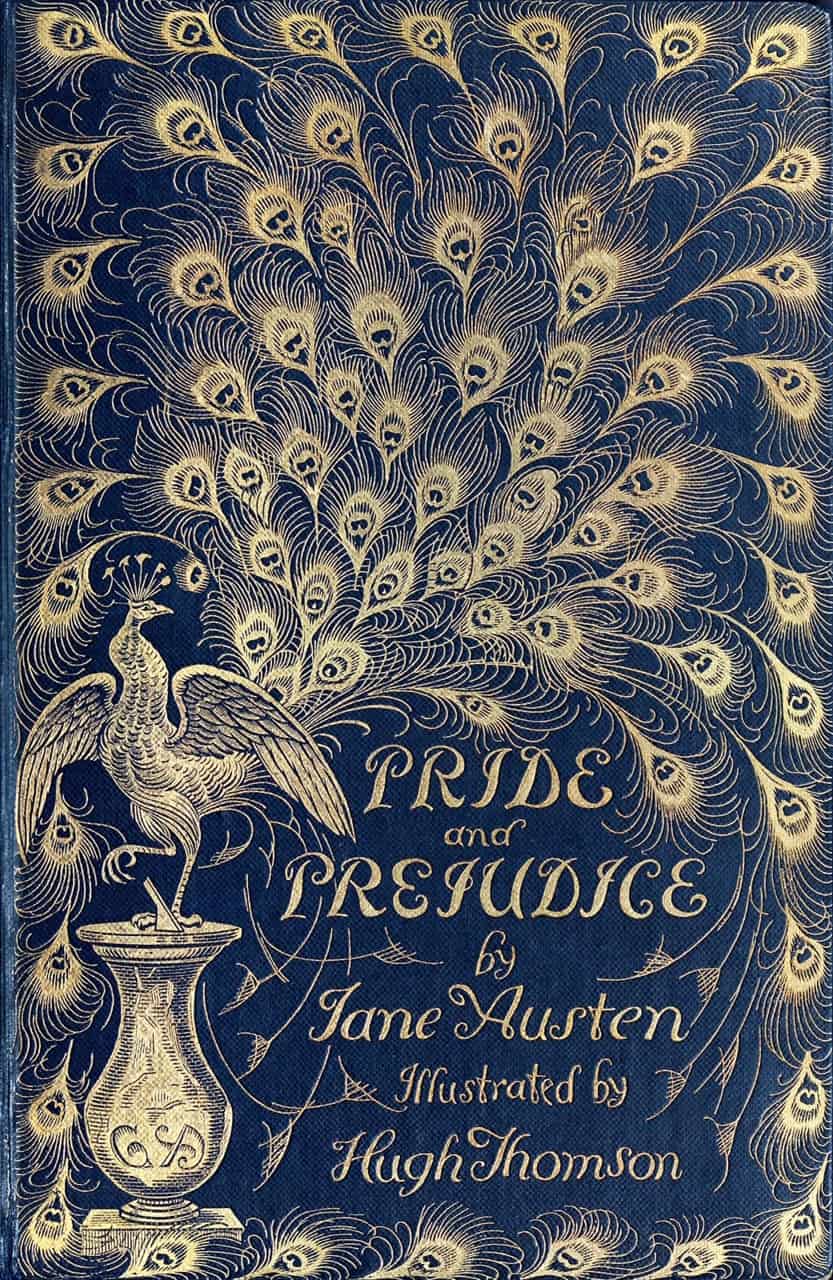Virginia Woolf wrote that Jane Austen “stimulates us to supply what is not there”. Perhaps this partly explains the longevity of Pride and Prejudice, first published January 1813.
PREMISE
Five daughters and their mother attempt to find husbands in order to secure their economic futures.
Jane Austen’s works are timeless classics because she knew the real horrors in life are having to listen to men who think they’re better than you and receiving unannounced visitors.
@galacticidiots
CONTROLLING IDEA
Use a love story and much irony to depict the prejudice that occurred between different early 19th Century socioeconomic classes.
THE LETTERS
Although Austen does explicitly abandon the form of the epistolary novel, she does not stop testing and reevaluating the personal letter. In every one of her finished novels it is there, playing a crucial, often decisive role, as if it were a character in its own right.
Mary Favret
Sense and Sensibility contains twenty-one actual or summarized letters, and Pride and Prejudice, forty-four, a preponderance of letters unmatched in any of the other novels.
Letters as physical objects serve as props, and characters speculate endlessly about their contents. Epistolary fiction is notoriously voyeuristic—half the thrill of a novel […] is the titillating prospect of reading someone else’s mail.
DEBORAH J. KNUTH KLENCK, Sense and Sensibility and Pride and Prejudice as Revisions
Consider Austen’s decisions about letters and epistolary summaries in the early chapters of Pride and Prejudice . While the verbatim transcript of Caroline Bingley’s insinuating invitation to dinner serves to illustrate her characteristic archness, which here takes the form of snide antifeminism (“‘a whole day’s tête à tête between two women can never end without a quarrel’”), there seems no reason to follow up with the full text of Jane’s letter announcing her cold: the second letter could easily have been summarized. At times, the narrative reads almost as a list of the letters that formed the earlier version of the novel. While Jane remains ill at Netherfield, for example, we are told that Elizabeth “requested to have a note sent to Long-bourn, desiring her mother to visit Jane. . . . The note was immediately dis-patched”. Two days later, still during this Netherfield visit, two more letters are summarized. […] spelling, grammar, style, and even handwriting reveal character, of course. […]
Mr. Darcy’s careful writing, whether to his sister in a routine letter or to Elizabeth Ben-net in his elaborate self-justification, is an indication of the steadiness of his character (48; 196). Elizabeth’s failure to interpret this sign correctly is characteristic of her judgment at these points in the novel: she rather applauds the slapdash epistolary style Mr. Bingley confesses to. […]
Style is substance. […] Lydia Bennet’s letters to her sister Kitty remain mysterious—more negative evidence— because they are “much too full of lines under the words to be made public”. […]
Elizabeth Bennet of course pre-judges Mr. Collins by his first letter—“‘There is something very pompous in his stile.. . . Can he be a sensible man?’”—and for once her “first impression” is accurate—she could never marry a man who would write such a letter. […]
But other comical letters are lost to us. When Elizabeth writes to askfor the family carriage to collect her and Jane from Netherfield, Austen summarizes, “Mrs. Bennet sent them word that they could not possibly have the carriage before Tuesday; and in her postscript it was added, that if Mr. Bing-ley and his sister pressed them to stay longer, she could spare them very well”(59). Since the last thing Caroline Bingley wishes is to extend Elizabeth’s stay at Netherfield, Mrs. Bennet’s letter, with its especially inappropriate post-script, must have been funnier in its verbatim version.
DEBORAH J. KNUTH KLENCK, Sense and Sensibility and Pride and Prejudice as Revisions
JANE AUSTEN AND GOTHIC NOVELS
For Austen, thinking specifically of an English human nature, gothic novels remained distant; located in an ‘other’ place, they dealt also with an ‘other’ human nature. The rise of gothic fiction in the late Eighteenth Century was closely related to the growth in popularity of the travel narrative, both genres indulging in a form of exoticism through foreign locations and dramatic landscapes. ‘The Gothic is marked by an anxious encounter with otherness, with the dark and mysterious unknown’…
Nicola Bowring
SETTING OF PRIDE AND PREJUDICE
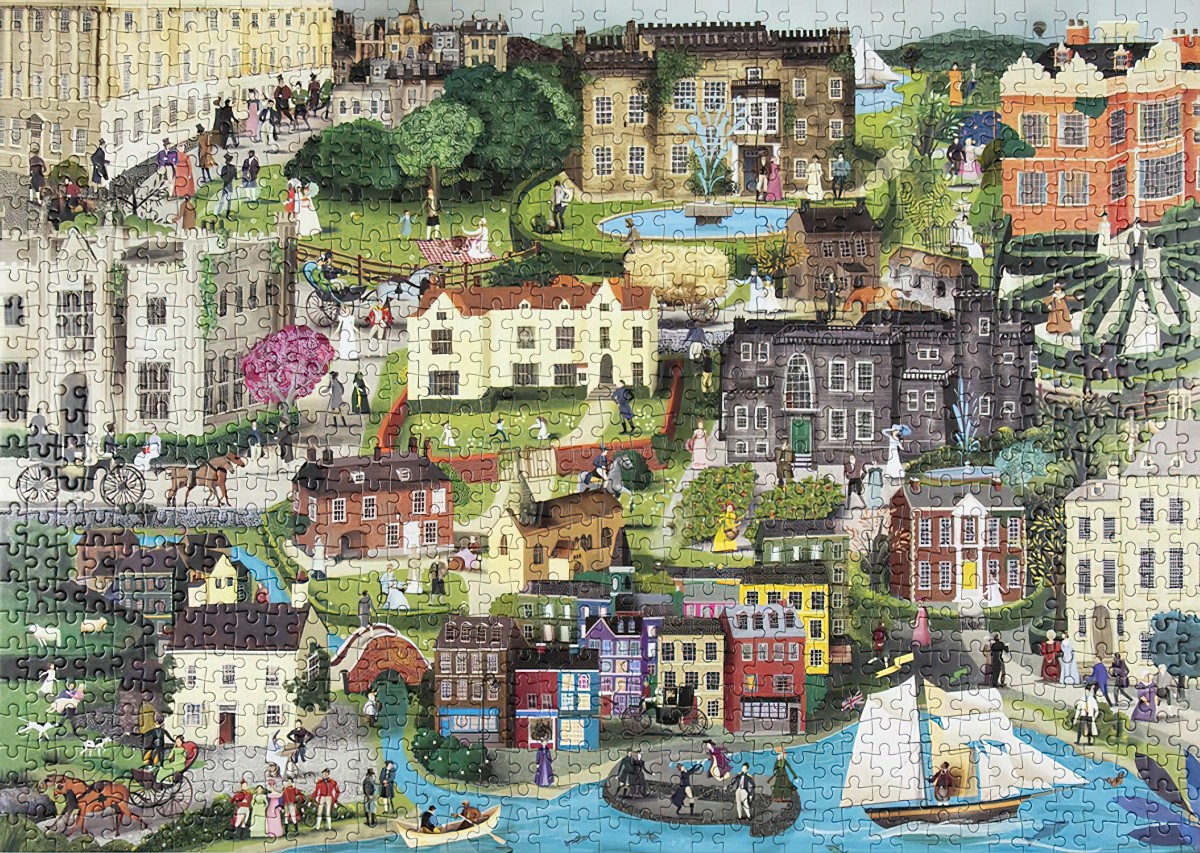
PERIOD
Sometime between 1797-1815. The exact year isn’t specified but the Napoleonic Wars are happening.
DURATION
a story’s length through time. Maybe it takes place over a year, cycling through each season. Maybe it takes place over 24 hours.
LOCATION
Various English towns and counties:
- Brighton
- London
- Hertfordshire
- Derbyshire
- Kent
ARENA
The Bennet sisters are barely allowed to leave the house, so much of the action happens inside houses: drawing rooms, bedrooms. They walk outside in the grounds of grand houses, but travelling alone between two houses is a perilous adventure (as proven by Jane, who ‘gets caught’ in the rain).
Even when they travel from town to town, they’re cossetted inside a carriage, looked after by servants.
MANMADE SPACES
Here are some paintings of drawing rooms, beautifully decorated gilded cages for the women who lived there?
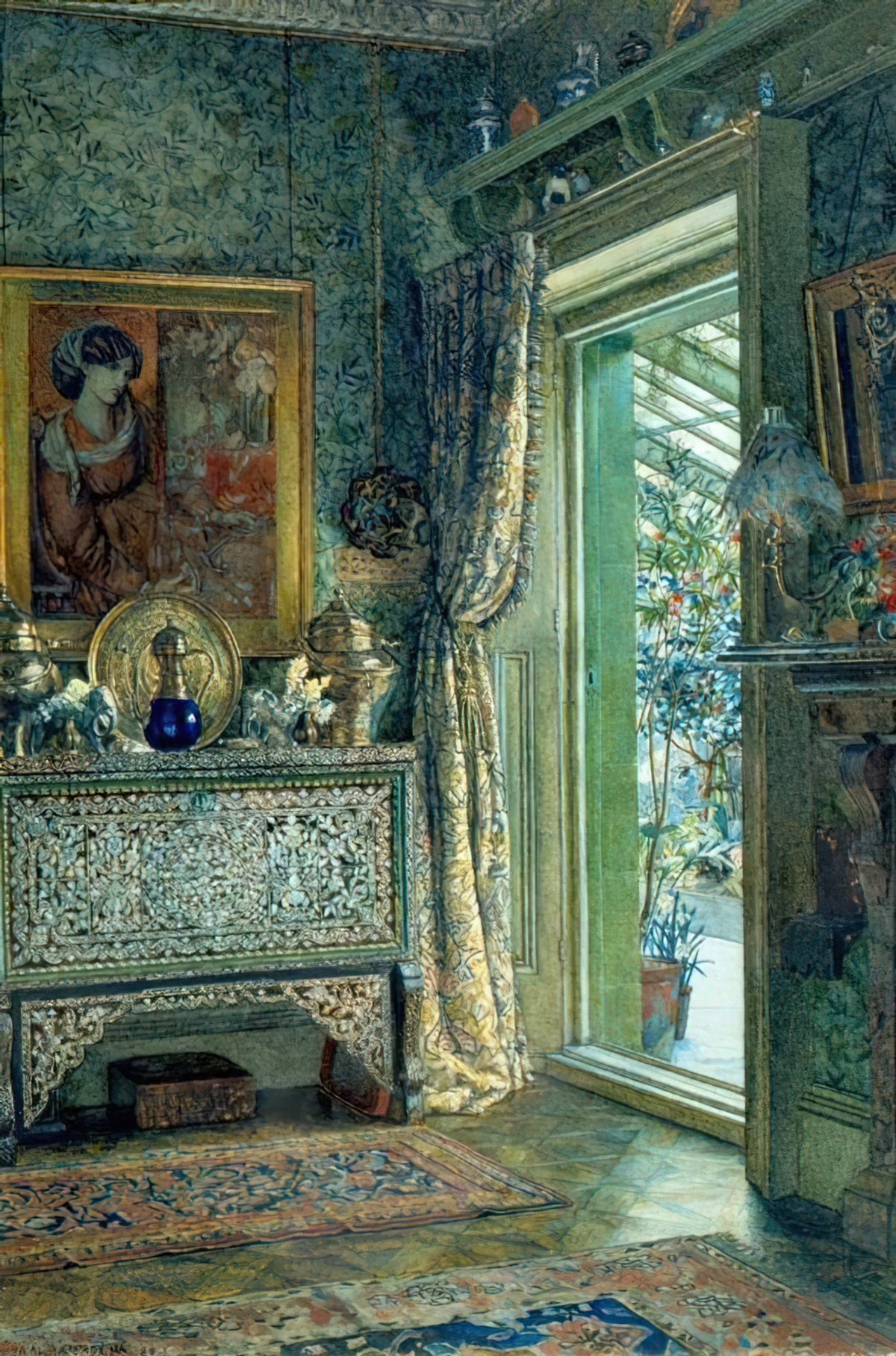
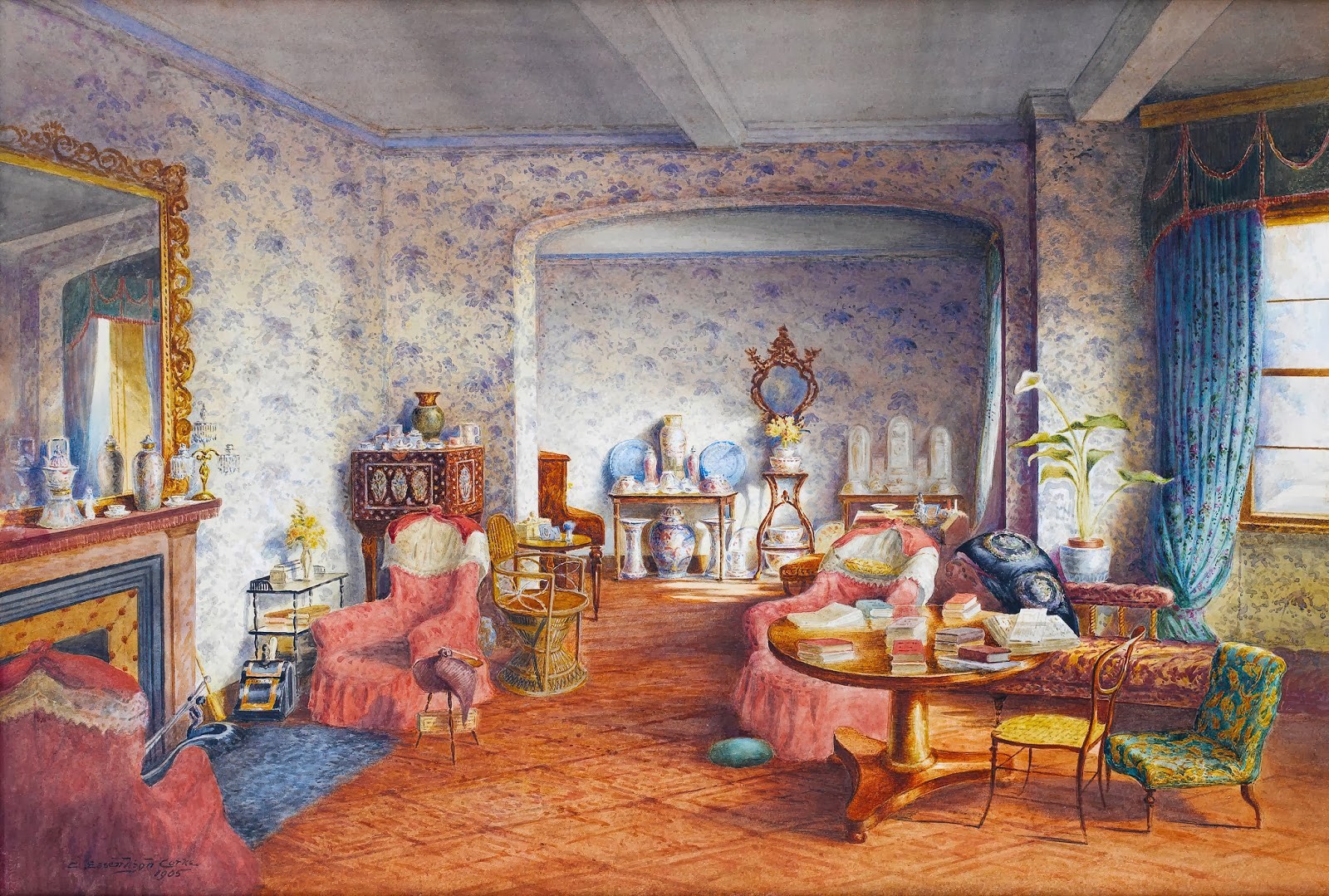
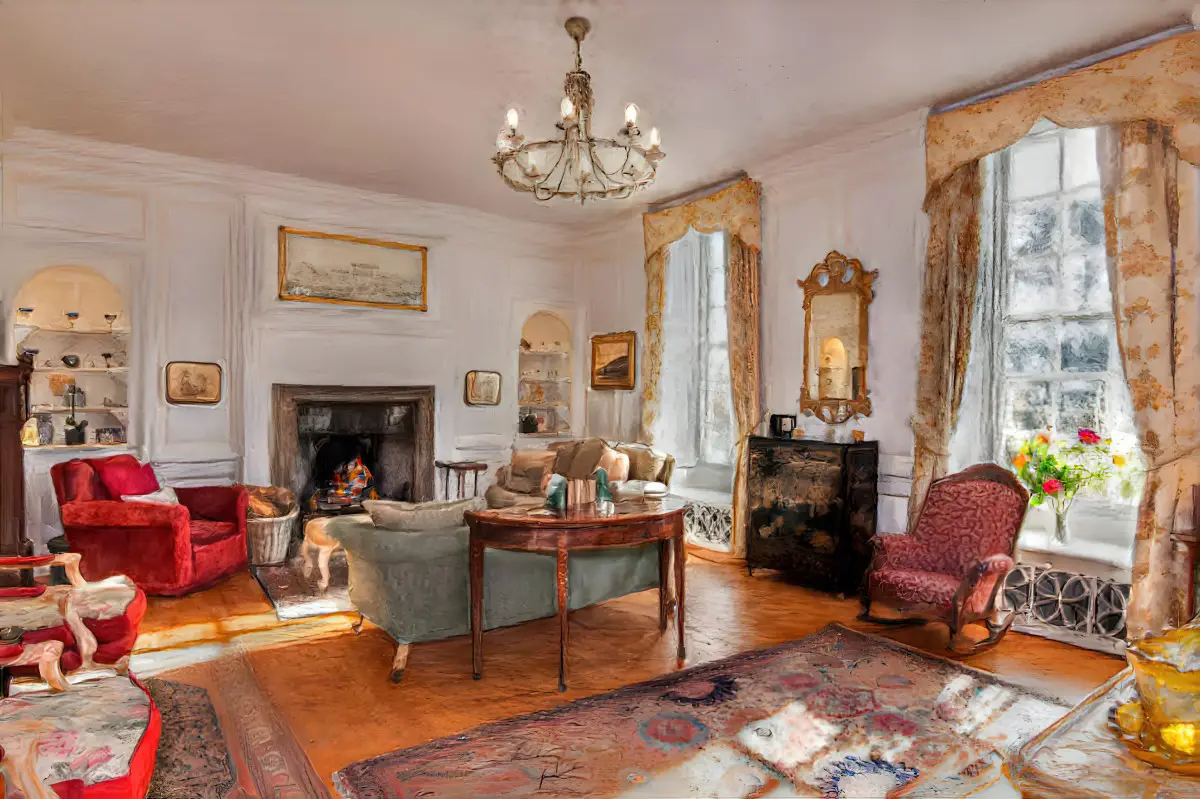
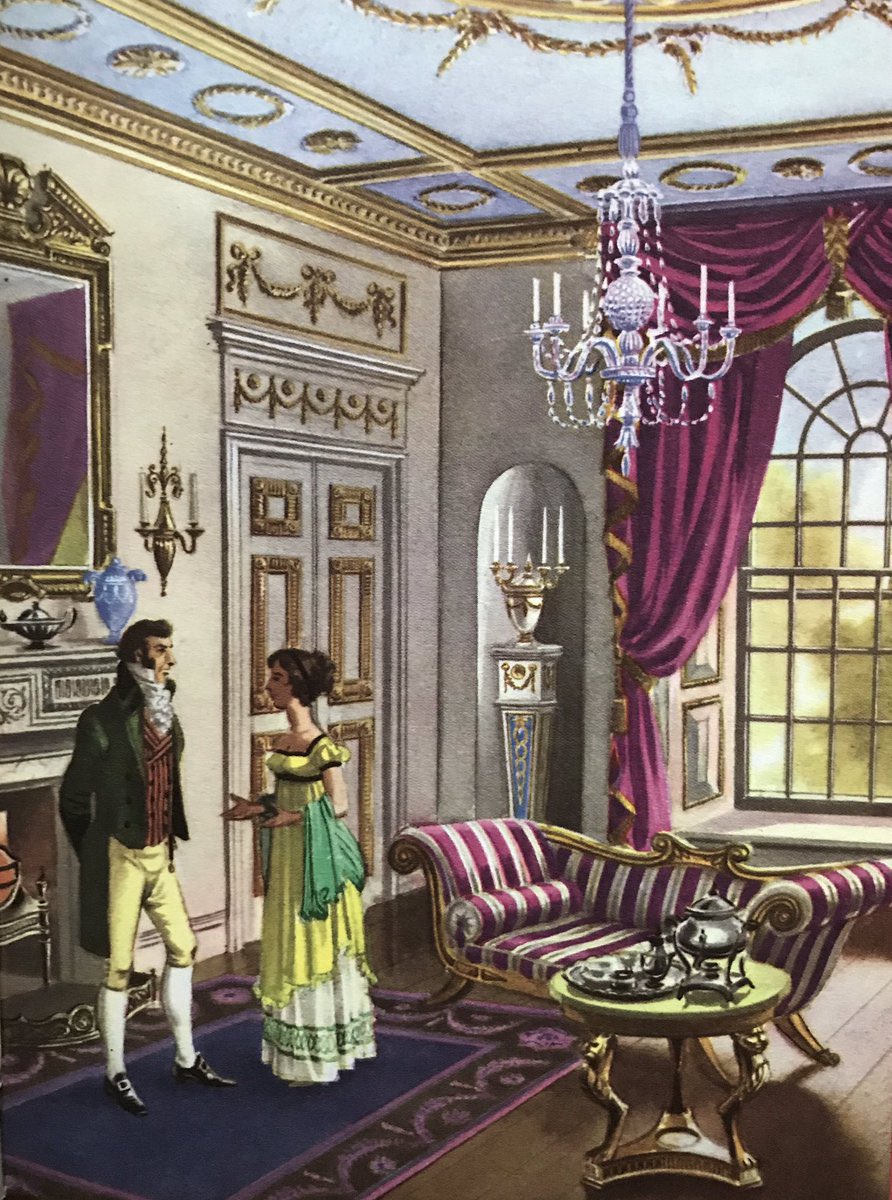
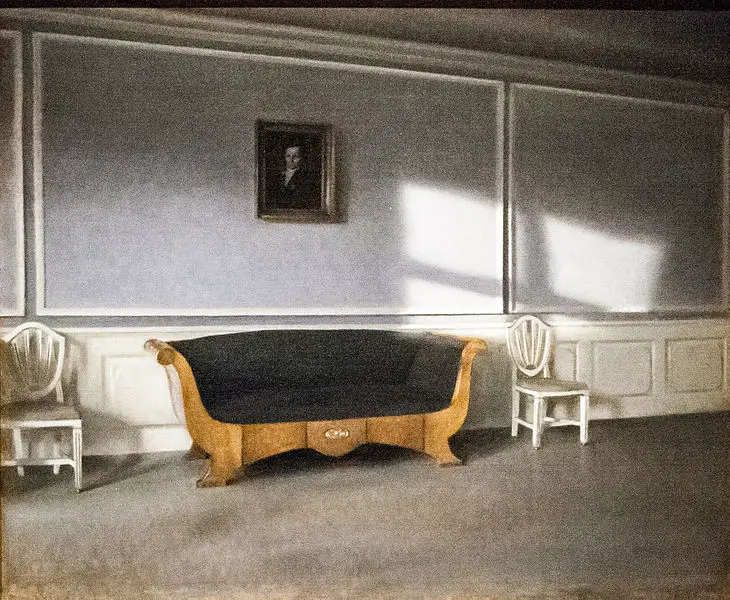
NATURAL SETTINGS
The sisters walk through English gardens, as carefully decorated and maintained (by servants) as the insides of the houses. These gardens are as close to wild nature as the young women are allowed to get.
WEATHER
There was no Bureau of Meteorology back then, but Mrs Bennet knew it when it was about to rain.
TECHNOLOGY CRUCIAL TO THIS PARTICULAR STORY
Letters are an important method of communication. Without a letter, people can appear to drop off the face of the earth. There’s nothing else. When you’re ghosted, you’re properly ghosted.
LEVEL OF CONFLICT
Because of the strongly patrilineal society, and Mr Bennet’s refusal to do anything about that, the Bennet sisters are in a precarious situation if they don’t marry. They will inherit nothing. This is the deep injustice which kicks the story off.
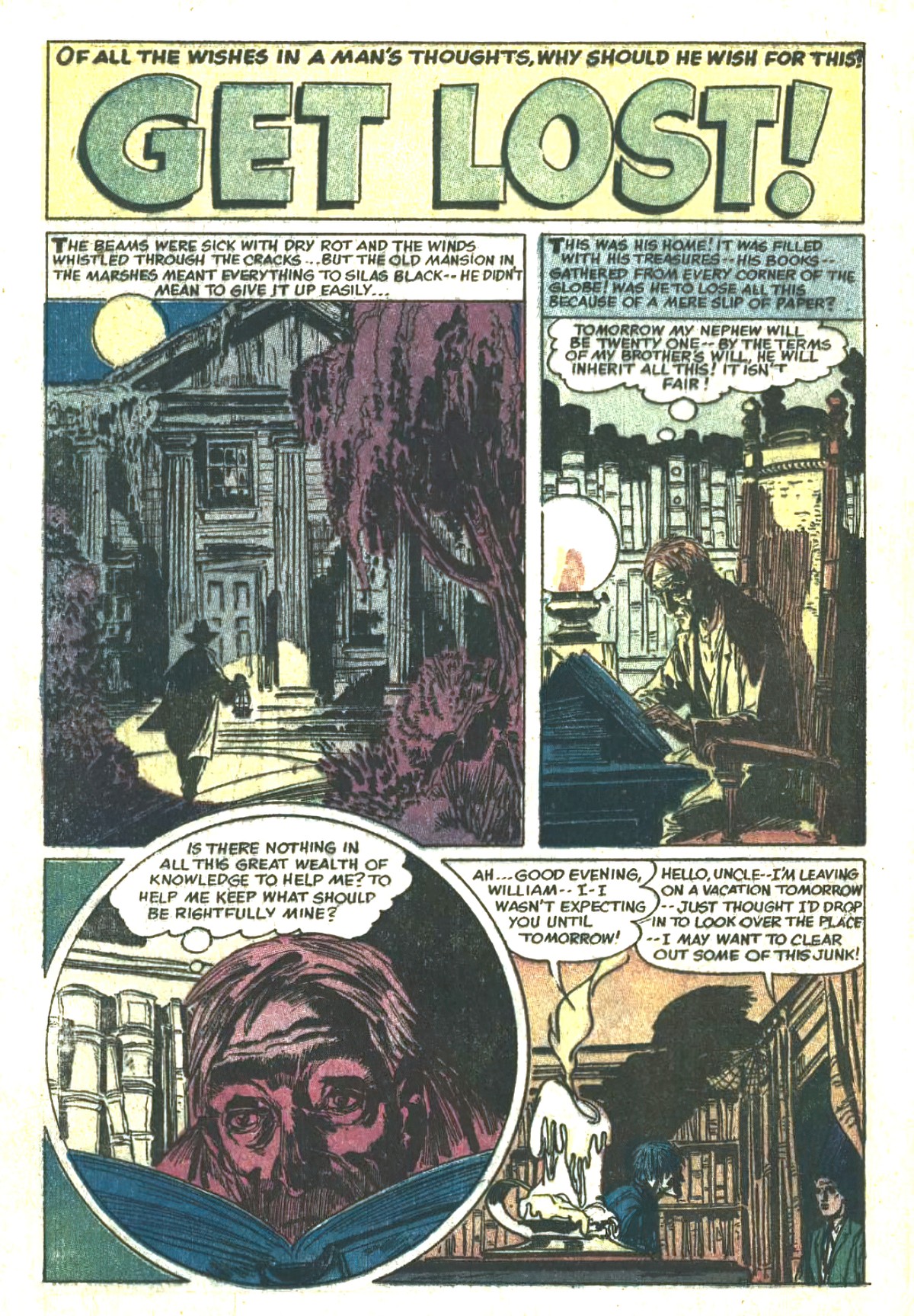
THE EMOTIONAL LANDSCAPE
All of the Bennet sisters are romantics at heart. (Charlotte, the next door neighbour highlights that fact.) Their mother is more mercenary about it, being older and closer to the pre-Romantic days. Lizzie believes in insta-love, or love at first sight, so she writes Darcy off. Over the course of the story she will realise that sometimes the best people are not the charmers, but the ones who take a little longer to know.
CAST OF CHARACTERS IN PRIDE AND PREJUDICE
ELIZABETH BENNET

MR FITZWILLIAM DARCY
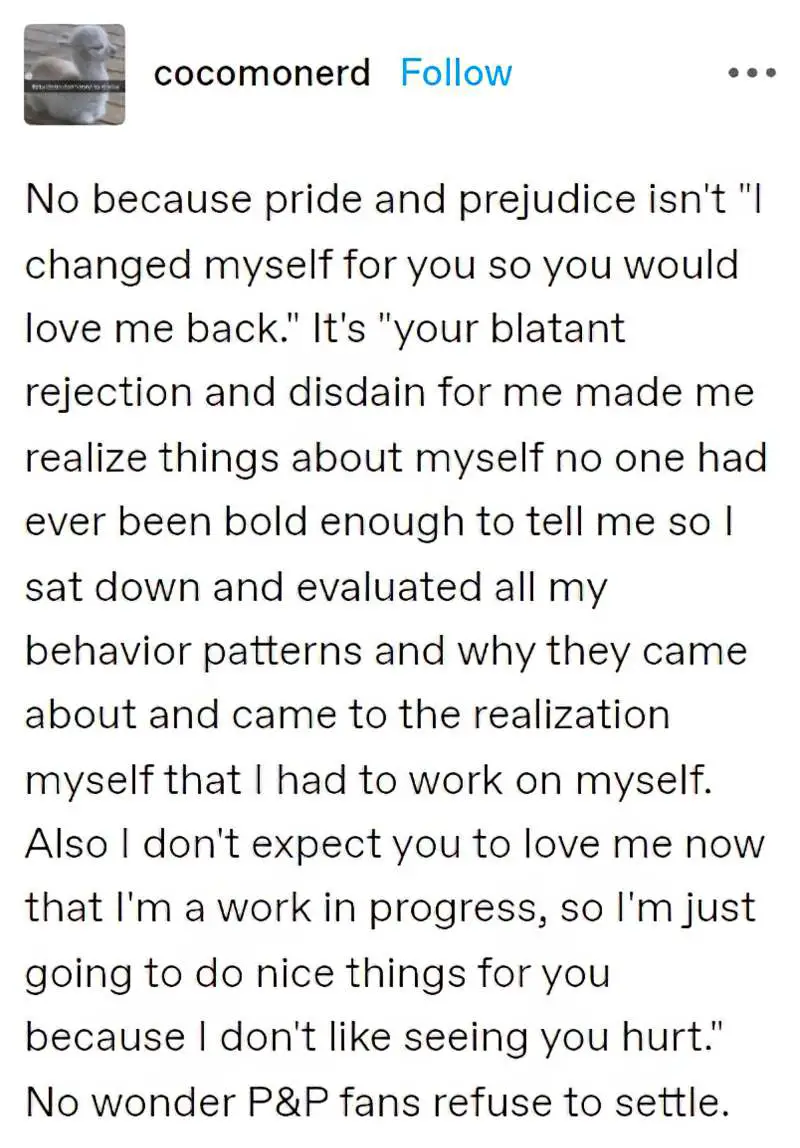
Here’s a psychological theory:
And an armchair diagnosis of neurodivergence:
9 times out of 10, grumpy love interests in romance novels are coded as autistic. In this essay I will… […] might actually have to go write a coherent essay now
@bethanylord_
I love the scene in Pride and Prejudice 2005 where Elizabeth is running for her life from the Darcy estate and Darcy catches up with her right before she can escape but I would kill for another perspective shot of Darcy because you don’t actually get to see Darcy run after her, but you can hear his footsteps on the stairs and then he’s suddenly there in the frame striding up to her and I just know that man flew down those steps. Elizabeth had the entire full staircase head start, Darcy no where in sight, then you can suddenly hear him tearing down the stairs in a span of like two seconds max which tells me he was absolutely leaping down those stairs like four steps at a time just to catch up with her. Absolute insanity.
ofwordsandpens on Tumblr
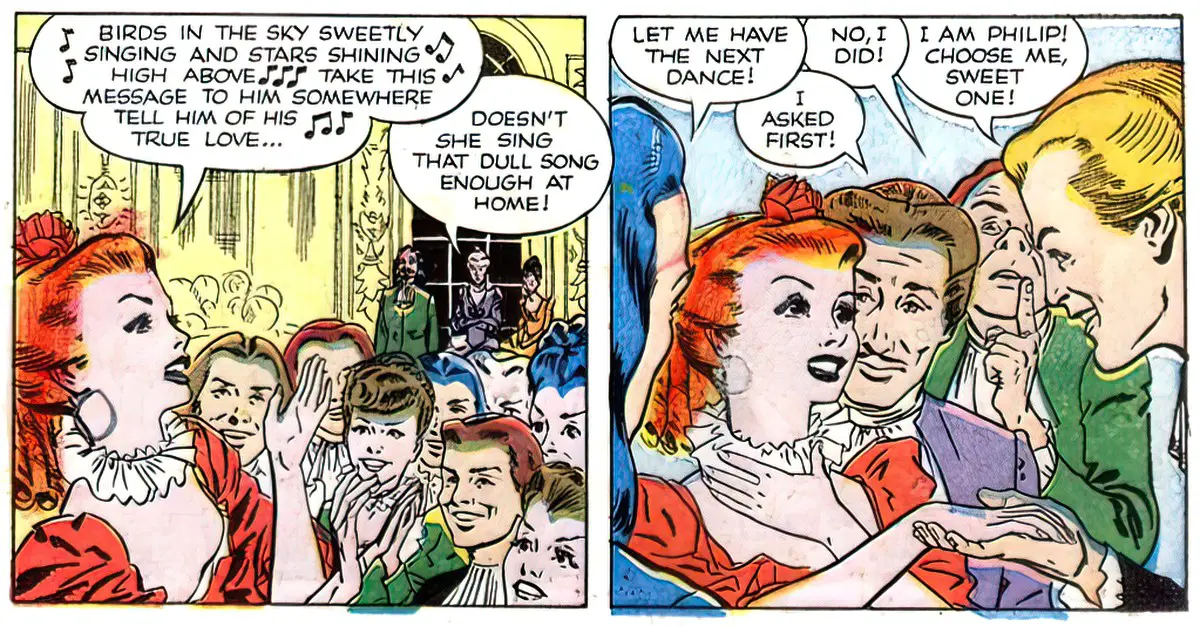
JANE BENNET
Jane is probably named after Mrs Bennet (based on the naming system in other Austen novels). Compared to Lizzie she’s not a very interesting character because she evinces no moral shortcoming. She’s the perfect princess of fairytale, who never says a bad word about anyone. The same story through Jane’s eyes would have been nowhere near as interesting.
Never forget that teenage Jane Austen wrote burlesques of popular romances, which is regency speak for fanfiction. Go on and write your kinky smut and your angsty slowburns bravely and shamelessly, babes. The Brontë sisters also used to create made-up fantasy worlds and add characters from popular fiction and real life into their stories, so you could say they pioneered RPF. Classic lit girlies were writing Wattpad y/n fic in the 19th century.
@galacticidiots
Y/N (short for “Your name”) is a genre of fanfiction, common in Tumblr, Wattpad and Twitter imagines in younger fandoms, where the writer lets the reader insert themselves into the story: “Y/N” (or “(YN)” and other variations) is meant to be replaced by the reader’s name while reading. Y/N imagines are usually het.
Fanlore
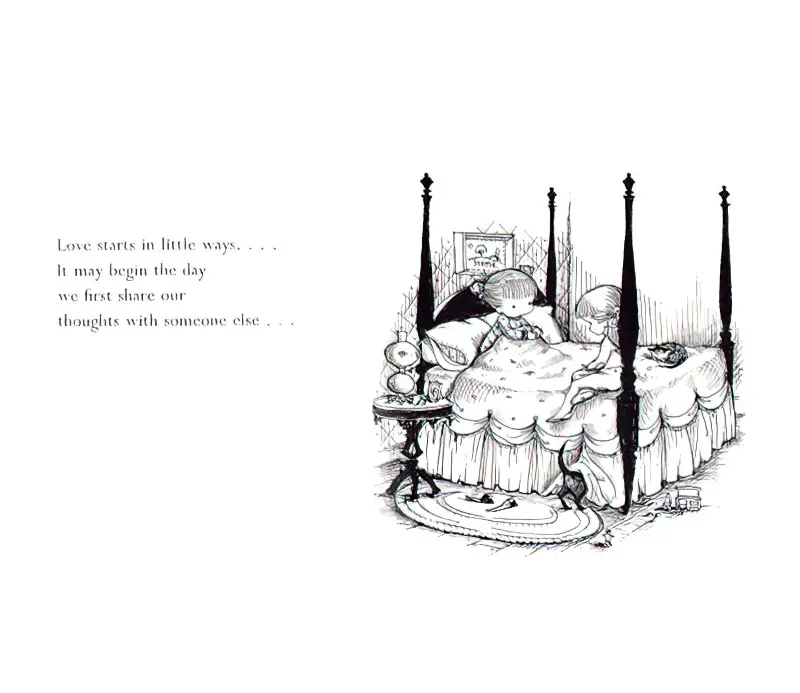
BINGLEY
As Kitty is the ineffectual shadow to Lydia, Bingley is the ineffectual shadow to Darcy, doing whatever he says.
He doesn’t see that his bff Darcy is a hypocrite. As explained clearly below:
So the TikTok guides told me to watch Pride and Prejudice. And I did because I forgot how incensed I become whenever I read or watch any version of Pride and Prejudice and we get to the part where Darcy proposes to Elizabeth… the first time. Like your man Darcy was really out here telling his best friend Bingley like, “I don’t see it for you and old girl, like, I don’t think she fucks with you like that, it seems like it’s mostly her mama that’s pushing her towards you, plus her family. Outside her and her sister, real tacky, they trashy, they loud. They seem like they’re looking for comeup. Don’t do that to yourself, bro.” And Bingley, understandably, was like, “You know what, Darcy’s my boy, he’s never led me wrong before, all right, bet. I’ll leave her alone.
CUT TO this grimy-ass motherfucker Fitzwilliam Darcy… PROPOSING… to ELIZABETH a.k.a. Bingley’s girl Jane sister, from the same motherfucken family. Elizabeth, a girl that giving him no kind of vibe. Homegirl would not give him the time of day, like, I’m talking this girl would not piss on dude if he was on fire. Like, she was not checking for Darcy like that AT ALL in the beginning. Okay? But he proposed to her. Like, you just talked all this trash about homegirl family to Bingley, but you gon marry his girl sister? Like, my guy, what was the angle here? What was the plan? Like, if Elizabeth had said yes the first time, how exactly was Darcy about to spin this to make sense for Bingley? You just told him to not marry somebody that he really cared about because you felt that she didn’t really like him like that and that her family was just not ‘deserving’ enough to be associated with him.
But you go and marry her sister.
So although there’s a fan theory that Darcy is autistic, I put it to you that ostensibly neurotypical Bingley is no more socially adept than Darcy is. However, he has the appearance of socially adept, because he smiles a lot and makes eye contact and falls quickly and easily in love.
MR BENNET
Frustratingly blind to the plight of his daughters and probably politically naïve. This is a man who has been cossetted all his life. He married the wrong woman who is not his intellectual equal, though we might instead argue that he is simply more highly educated. He was attracted to his wife because of her youth and beauty.
However, his misogyny is disguised somewhat, even for modern readers because he gets some very good one-liners.
When you’ve had enough of your visitors, a quote from Mr Bennet may serve you well:
You have delighted us long enough.
Mr Bennet
But trained on Mr Bennet, I’m always suspicious of my initial reactions to characters with the best one-liners. Are they really good people, or am I bamboozled because they are witty? There are plenty of elite comedians in this world who get a pass for despicable behaviour because they are also funny. All of them are male.
Even Lizzie gives her own misogynistic father a pass because he is so much wittier than her mother, but it is actually Mrs Bennet who understands the gravity of the situations. We dismiss her because of her stereotypically feminine mode of expression.
Lizzie eventually has an epiphany about another man in her life, Darcy, but does she ever come to terms with her own father’s lack of caring about the status quo, and his political naivety?
Could Mr Bennet have simply changed his will to leave everything to his wife and daughters? Not so easily, because misogyny was systemic:
Mr. Bennet’s main asset was thus an estate of land at Longbourn, which generated an income of £2,000 a year by renting it out to tenant farmers. The estate was ‘entailed’, meaning that in law Mr. Bennet was a ‘tenant in tail’: he could make use of the estate while he was alive, but he was not allowed to sell the land, and he could not dispose of the estate in his will. Instead the estate would pass at his death to the next male heir in line of the landowner who originally created the entail. Since Mr. Bennet had no male heirs, the estate would pass to his cousin Mr. Collins (except in remote circumstances, such as Mrs. Bennet dying, Mr. Bennet marrying again and having a son).
Literature StackExchange
However, he could have done a lot more, as the same commenter explains:
The entail only covers the Longbourn estate, and does not include Mr. Bennet’s other property, and so if he had been more prudent, he could have saved money out of his income from the estate in order to support his family after his death…However, he did not do this, because his plan for providing for his family was to ‘cut off’ (or ‘bar’) the entail.
Entails were known to be unjust but weren’t abolished in England until 1925.
MRS BENNET
Smarter than she appeared. Austen turned Mrs Bennet into a figure of fun and she is played as such by actresses such as Alison Steadman for the 1995 BBC adaptation.
Since Mr Bennet married her when she was young, maybe late teens, and firstborn Jane came along very quickly, she was only about forty at the time of the story.
MARY BENNET
Like Mrs Bennet, Mary is a figure of fun. I like to imagine she and Mr Collins married. However, Mr Collins is one of those men who games dating, starting with the most beautiful prospect and working his way down. Had Charlotte Lucas not accepted his hand, Mary may well have been next. Ironically, comically, Mrs Bennet is so caught up in mercenary marriages that she fails to consider personality fit at all. If she had, she’d have set Mr Collins up with Mary from the get-go.
The 1800 name pool was, by modern standards, surprisingly small, and this is echoed in Jane Austen’s constant reuse of the same names. Take the name Mary; there are two Marys in Pride & Prejudice (Mary Bennet and the heiress Mary King, pursued by Wickham); a Mary Crawford in Mansfield Park; and Mary Musgrove in Persuasion. […] Few novelists nowadays would have three characters with the same first name in the same novel – even if they are not major characters. However, […] Jane Austen both mirrors and comments on the customs of the time.
Elizabeth Hawksley
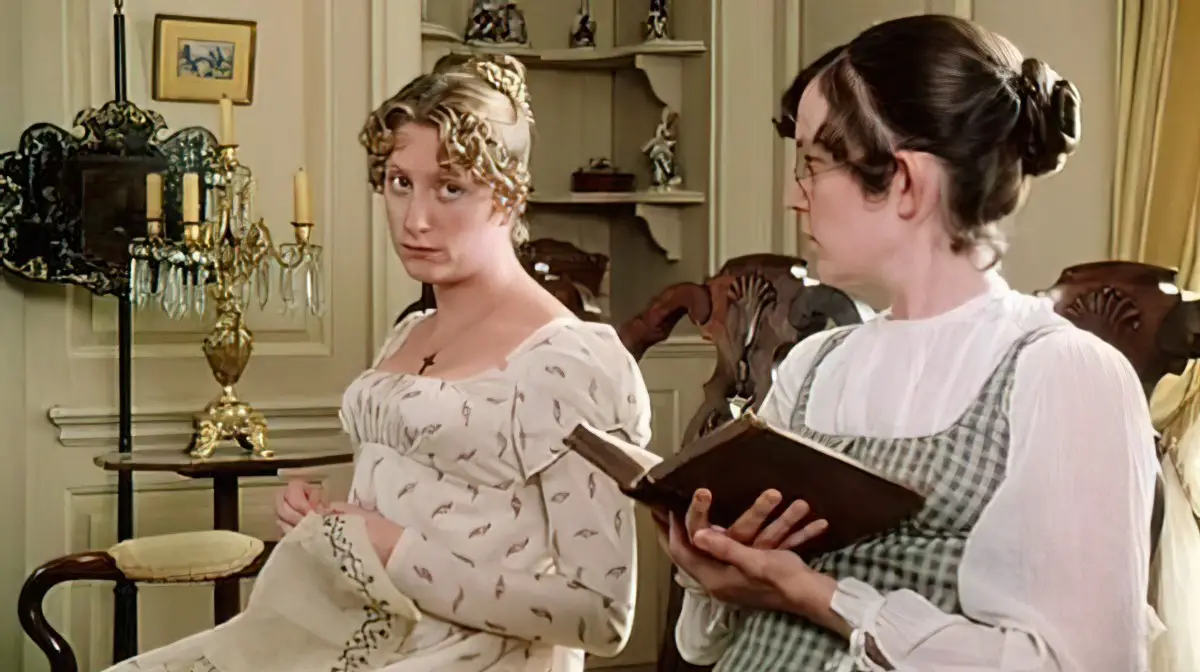
KITTY BENNET
Despite being older than Lydia, Kitty is a follower.
In this respect she is similar to Bingley, who follows whatever Mr Darcy does.
LYDIA BENNETT
How much agency did Lydia truly have? Today’s audience is more likely to read the Lydia subplot as grooming.
Lydia Bennet, a “most determined flirt,” has sexual visions that are even more intense than Elizabeth’s, especially when she dreams of the military men who crowd the streets in Brighton, and sees “herself the object of attention, to tens and to scores of them at present unknown,” or imagines “herself seated beneath a tent, tenderly flirting with at least six officers at once.” In allowing us access to Lydia’s sexual fantasies, Austen explodes Regency notions of women as passive and pure, and “gets at the impulse behind the pornographic imagination, which seeks for the self a sensually realized, beautiful, but undifferentiated and impersonal more,” as Robert Polhemus puts it in Erotic Faith (1990).
Just How Much is Jane Austen a Precursor to Bridgerton? at LitHub
MR COLLINS
The Longbourn estate, occupied by the Bennet family, is entailed on Mr Collins. Mr Collins’ parents would have always known that their son would inherit this estate if Mr and Mrs Bennet had no sons. I’d like to see a spinoff in which Mrs Bennet does produce a son, who goes missing on the moors. The Collins side of the family has arranged to have him dispatched with. Mr Collins uncovers what happened during his married life at Hunsford Parsonage, which messes with his head.

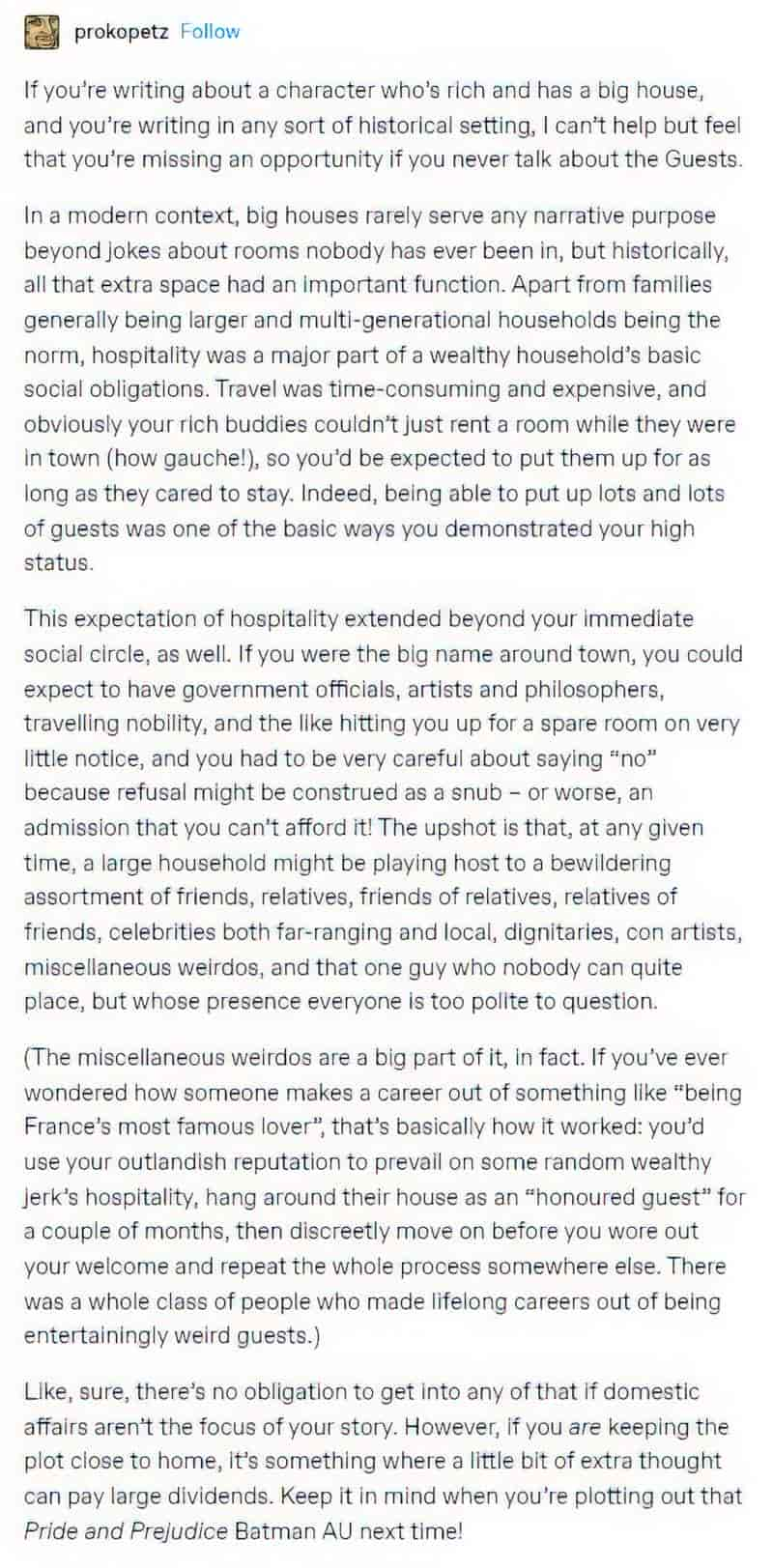
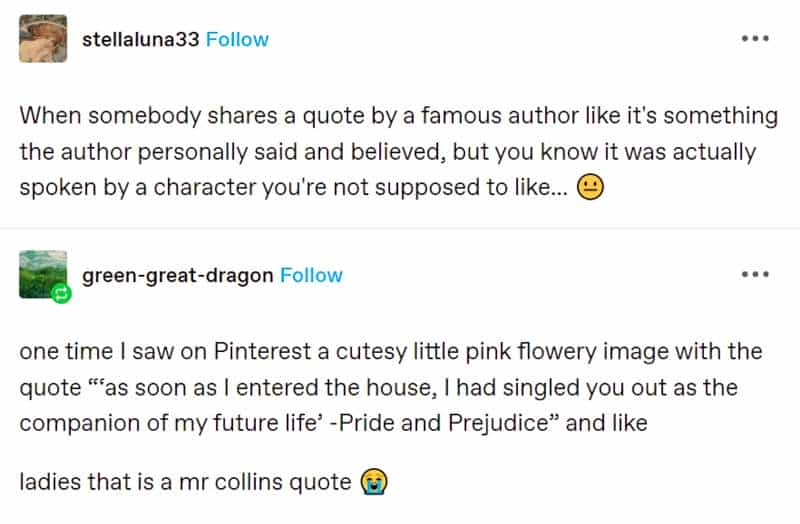
CHARLOTTE LUCAS COLLINS
It’s often said that, from a material point of view, Charlotte has “no choice” but to marry Collins. I myself talked this way just now, when I said that Charlotte ends up marrying Collins “because she isn’t young, pretty, or rich,” despite the fact that she’s “a sensible, intelligent person.” But that’s actually to misstate, or reverse, Charlotte’s situation. It’s certainly true that she isn’t young, pretty, or rich, and that those facts set the stage for her marriage. But it’s also true that Charlotte marries Collins because she is sensible and intelligent. It’s actually her sensibleness that gives her no choice but to do it. What really compels her to marry him is her thoughtfulness.
Joshua Rothman at The New Yorker
It truly is unbelievable when looked at in the context of world history because the notion that we would not only be married but not only happily married is only roughly to the middle of the eighteenth century. Until then, you tolerated your partner for the sake of domestic concerns and children. You did not expect to love them. A very new idea was born in the middle of the eighteenth century, that historians call ‘Romanticism’. And we are all the heirs of Romanticism. And the way that human beings love is very context and society dependent. There’s that lovely quote by La Rochefoucauld, “There are some people who would never have fallen in love had they not heard there was such a thing.” Slightly too cynical, but really what this is alerting us to is very dependent on our society and these days we love romantically. We are all the heirs of Romanticism.
Alain de Boton
Next, de Boton runs through some of Romanticism’s dominant features:
- All of us have a soulmate.
- Our task is to find that person.
- We will feel an instinctive attraction to that person and know they are our destiny.
- When we find the soulmate we will never be lonely again. All our feelings and hopes will be confirmed by this person.
- We will have no more secrets. They will understand us completely and they will understand them.
- Romanticism is very tied up with long, balmy summer afternoons; walks in nature; much emphasis on waterfalls and large, watery expanses; dusk.
- Love and sex go together because sex is the ultimate expression of love. Romanticism turns adultery into a tragedy, and becomes the most important theme of 19th century novels: Madam Bovary, Anna Karenina, etc.
Alain de Boton also believes that Romanticism is the single greatest enemy we face for love.
I suspect this is how Jane Austen felt, too. Drawn as she was to the love stories and happy endings for Jane and Lizzie Bennet, in Charlotte she gives us the traditional view of marriage. For Austen’s contemporary readers of Pride and Prejudice, Charlotte would have seemed like a traditionalist. She is not all that beautiful for a specific thematic reason: She is a young fogey (a middle aged person in a young person’s body). To today’s readers, Charlotte can seem more cynical than traditionalist. To others, she even seems perspicacious and modern. After all, it is only really in queer circles (especially in aroace circles and in polyamory) that sex and love are teased apart, considered different aspects of a relationship.
LADY CATHERINE DE BOURGH
Roses are red,
@PalaverFlap
Kittens have fur,
Your Valentine has a patron
Named Lady Catherine DeBourgh
Lady Catherine and her sister Anne were the daughters of an earl. So Lady Catherine married down when she married Sir Lewis de Bourgh, a mere baronet.
Elizabeth Hawksley
I imagine her daughter looks a little like this:
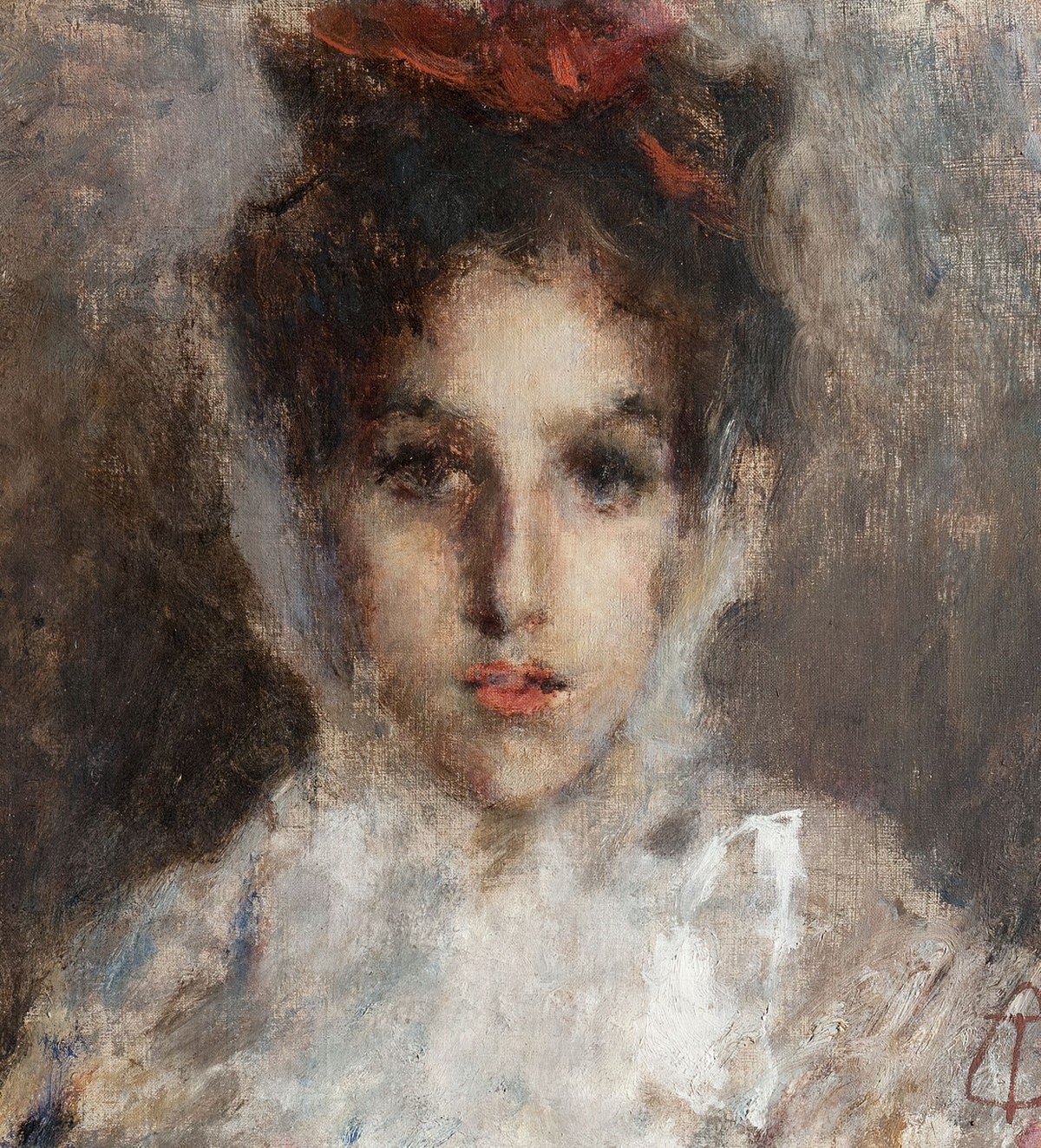
MRS GARDINER
Lizzie’s confidante
Mrs. Gardiner remains an important character in Pride and Prejudice :the Gardiners chaperone the reunion of Darcy and Elizabeth at Pemberley, promote Darcy’s arrangements for Lydia’s marriage, and retain pride of place in the novel’s last paragraph as the Darcys’ closest friends.
DEBORAH J. KNUTH KLENCK, Sense and Sensibility and Pride and Prejudice as Revisions
GEORGIANA DARCY
the real victim in Pride and Prejudice is Georgiana Darcy, bc u know her brother spent at least two weeks lying around in his Regency Jammies eating Benjamin and Jerrold’s out of ye olde carton feeling sorry for himself bc his crush not only didn’t like him back but tore him to shreds in the process and Georgie had to deal with that and then said crush shows up at their HOUSE and she has to live w both of them probably stealing lovelorn yearning glances at each other the whole damn day while knowing if she even SUGGESTS to her brother that maybe perhaps his crush doesn’t hate his entire guts anymore he’ll just be all tragic about it bc “you don’t KNOW her Georgiana she dESPISES me and i DESERVE it”
hejgatsbykid on Tumblr
GEORGE WICKHAM
A large part of the reason that I get so annoyed by the idea that Austen’s heroes would obviously be having Period Mandated Sexual Exploits (aside of your sociology is bad and you should feel bad) is because yes, there are plenty of references to period-typical male sexual behaviour in her books.
like:
– Frederick Tilney leads a bratty but beautiful girl on to the point she thinks he’s going to marry her, then is like “bye, babe.”
– John Willoughby seduces a vulnerable young girl, gets her pregnant, and abandons her. He proceeds to carry on an increasingly intense flirtation with the seventeen-year-old dependent cousin of a local squire, then vanishes and marries an heiress.
– George Wickham stalks the fifteen-year-old daughter of his benefactor and tries to seduce her into an elopement to steal her large fortune, and only fails because she confides in her brother. Later on, he runs off with a sixteen-year-old girl because she’s pretty and available; he has to be bribed into marrying her.
– Henry Crawford flirts with two sisters, one of whom is engaged. After the latter’s marriage, they begin an affair. When it’s discovered, they run off together, but he doesn’t marry her or even stay with her–he gets bored and ditches her. The narrator remarks in passing that it’s a pity that men aren’t punished as harshly for this kind of fuckery as women. Another man in the novel suggests that both should be flogged.
– Frank Churchill falls in love with a poor governess and proposes to her, but insists it has to be kept secret until his rich aunt dies. He uses another, oblivious woman to conceal it, carrying on a very public flirtation with her before his fiancée’s eyes. (Fun fact: his wife dies young.)
– William Elliot, heir to a baronet cousin, pretends to some interest in the daughter of that cousin to repair bridges, then begins an affair with his apparent LI’s widowed friend to keep her from marrying the cousin and maybe having children to cut him out of his inheritance. He sets her up as his mistress.
Do you not see a common theme here?
anghraine on Tumblr
STORY STRUCTURE OF PRIDE AND PREJUDICE
PARATEXT
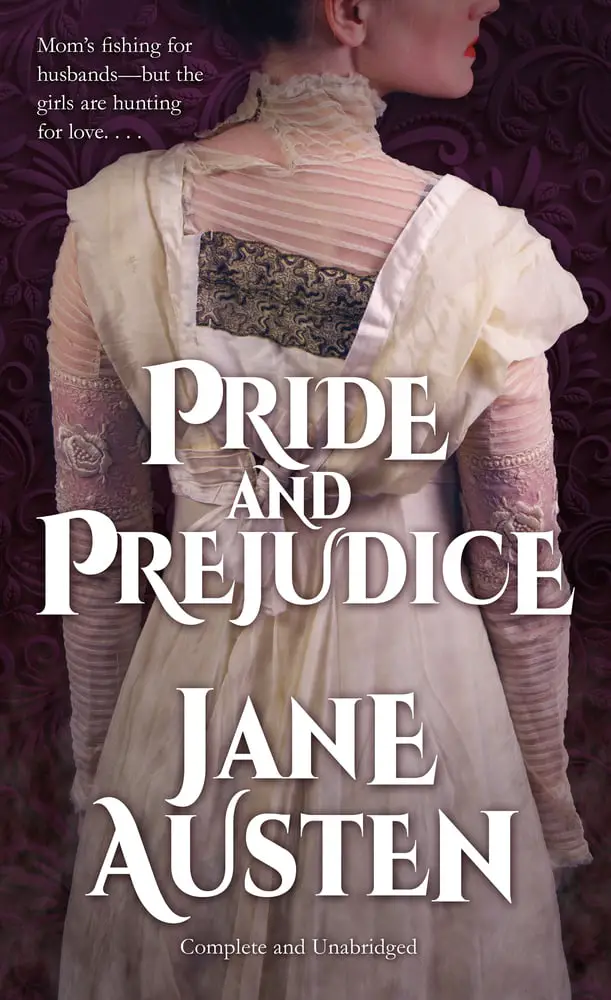
This edition of Pride and Prejudice has been updated with a tagline aimed at contemporary readers:
Mom’s fishing for husbands—but the girls are hunting for love…
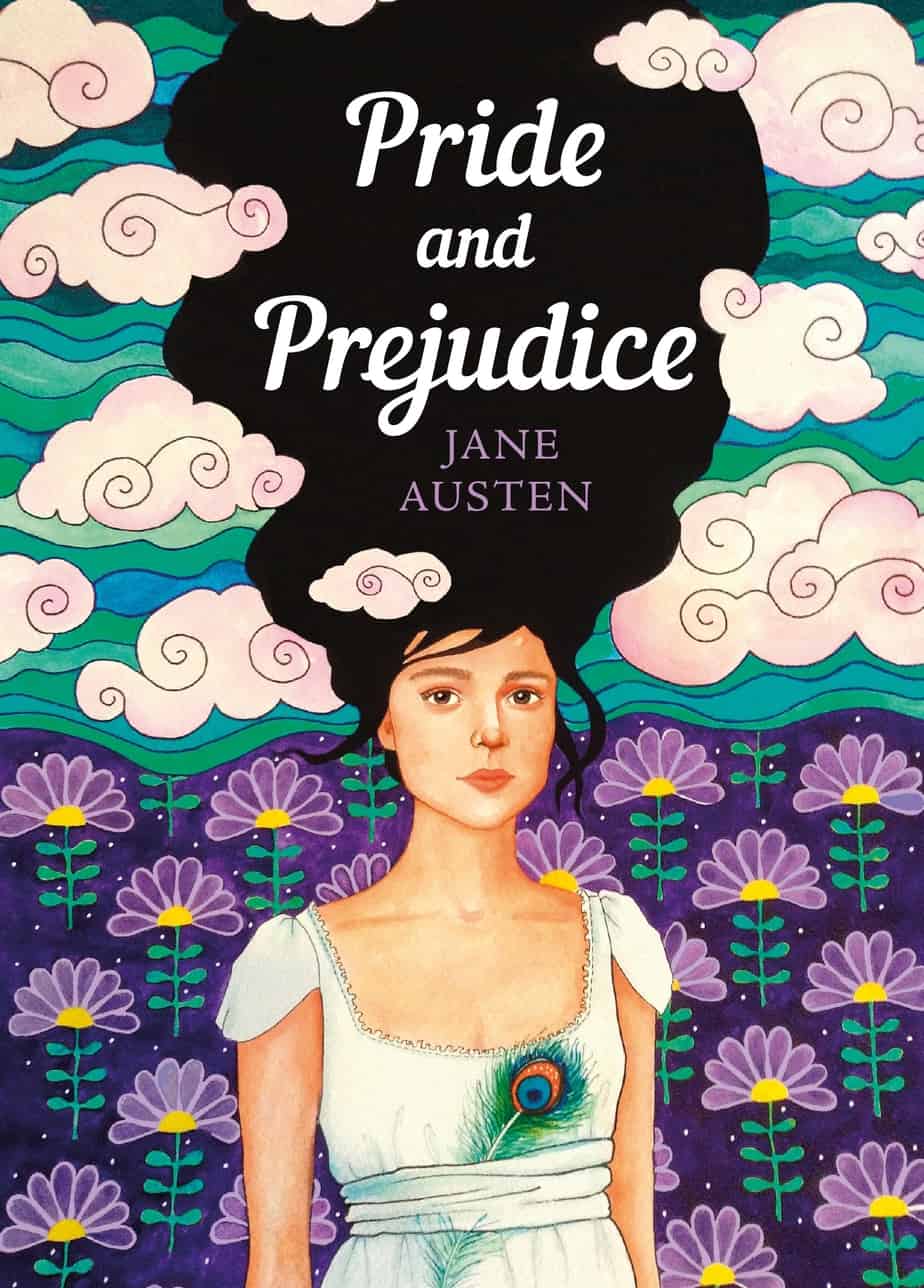
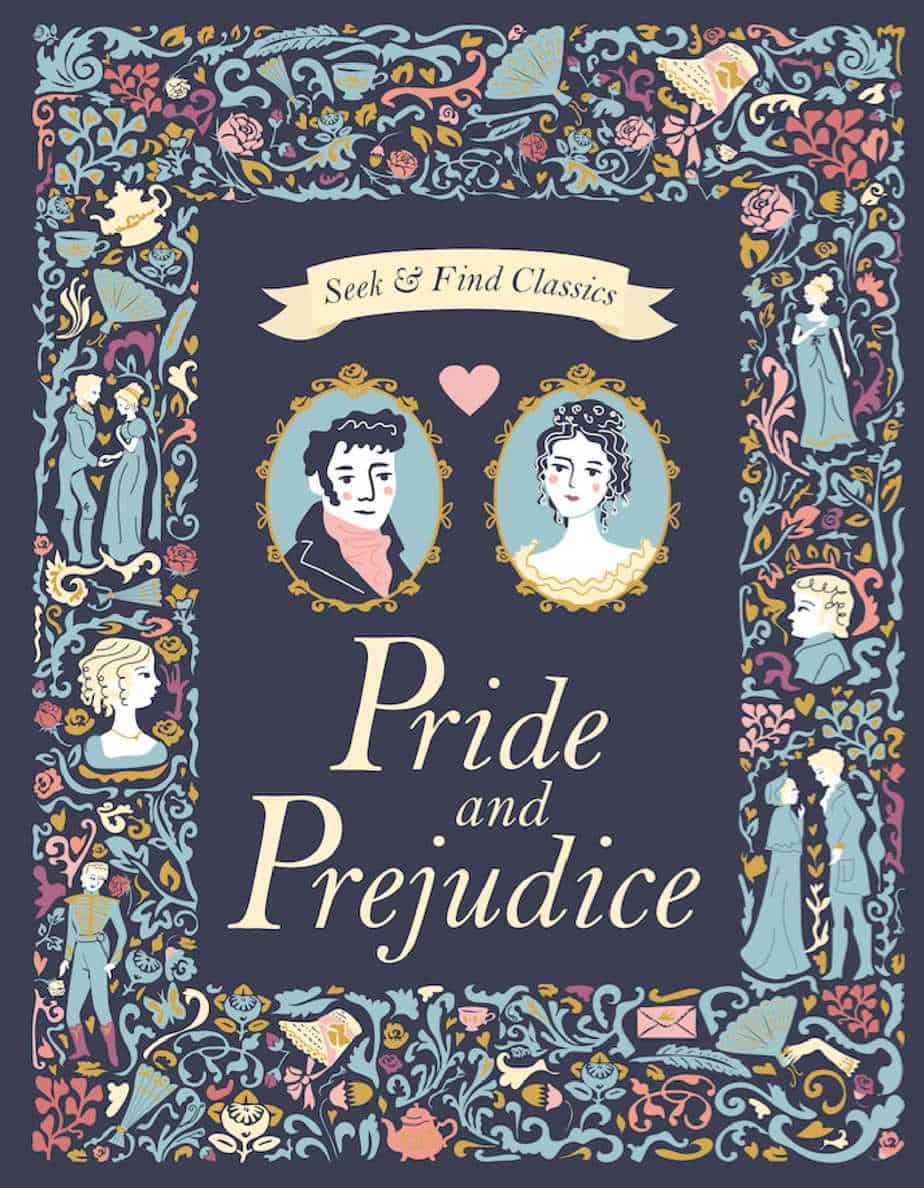
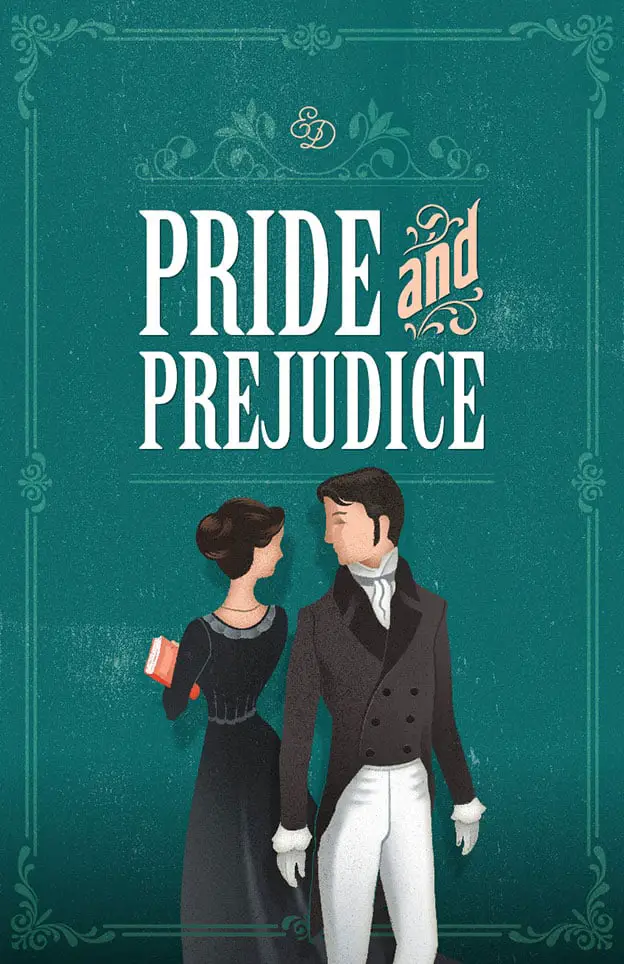
SHORTCOMING
Lizzie is a Romantic, who has absorbed the most damaging aspects of Romanticism, namely, in this story: You’ll know your soulmate as soon as you clap eyes on him.
DESIRE
Financial security and marital happiness.
the whole reason girls want to marry a Mr Darcy is so that he can pay for their crocheting addiction, book buying, traveling to hang out with friends, and candles
@cassafrass29
OPPONENT
Darcy is Lizzie’s love opponent, but apart from Jane and Mrs Gardiner, everyone else stands in her way at some point. Austen’s web of opponents is very complex.
PLAN
Pride and Prejudice is melodrama (in the sense explained here), so Lizzie reacts to trouble coming to the house. Usually in a story, a reactive character switches from shield to sword (to use a phrase I learned from tennis) and becomes more proactive.
THE BIG STRUGGLE
This part of the story is wonderfully ironic, as Lady Catherine de Bourgh instigates the love sequence while trying to stymie it, believing it to have already happened.
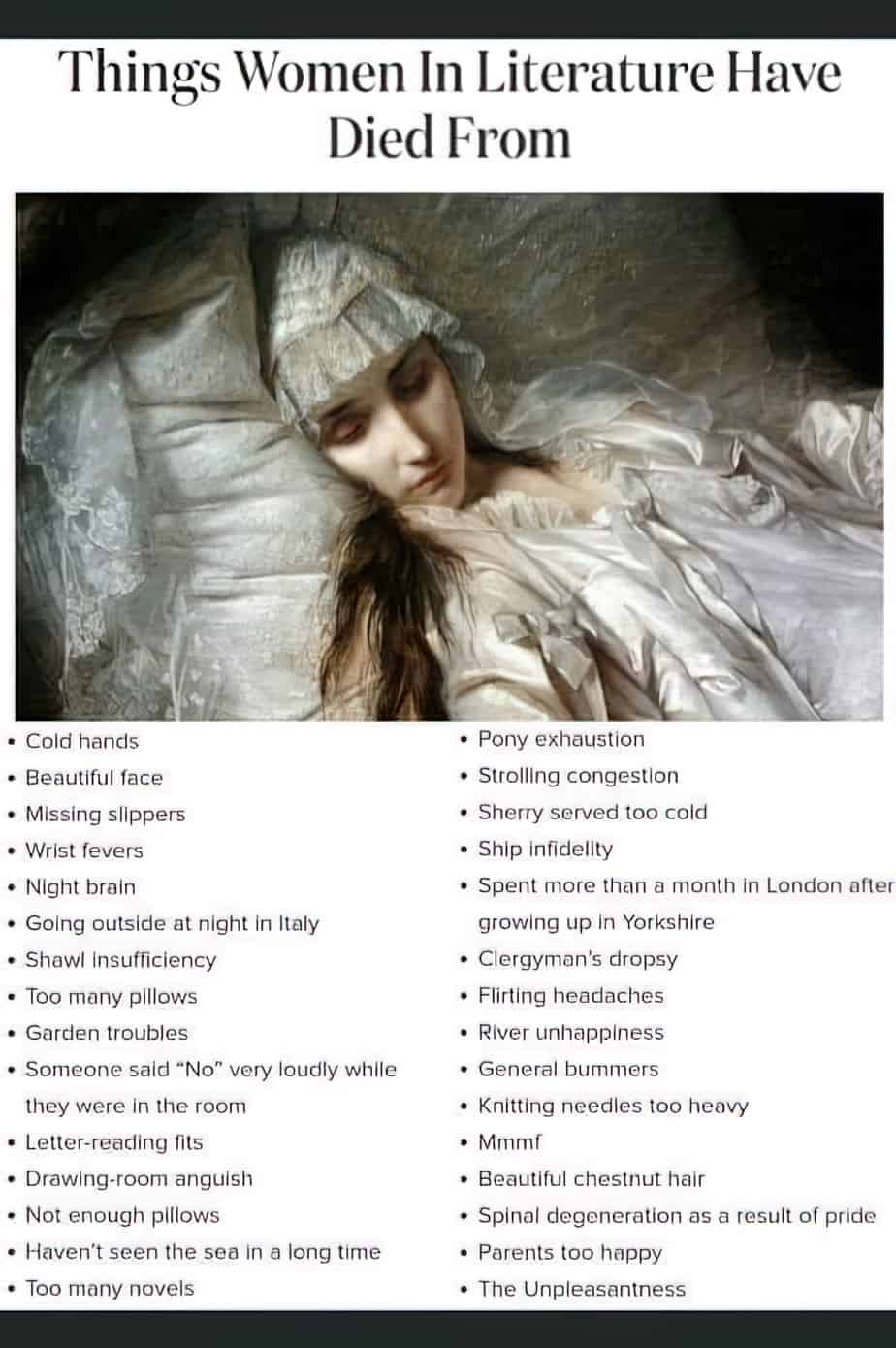
ANAGNORISIS
At what point do things turn for Lizzie? When she understands all that Darcy has done to save Lydia and the good name of her family.
Comically, cynically, she decides she’d like to marry Darcy after all when she claps eyes on his estate, though Austen makes the whole thing more tasteful by showing us the housekeeper, who has known Darcy since he was a little boy.
NEW SITUATION
Everyone lives happily ever after.
EXTRAPOLATED ENDING
Do they remain happy?
Australian author Colleen McCullough didn’t see good things for Lizzie’s life with Darcy and wrote a sequel to that effect. It was too depressing; I didn’t get far with it. However, I think she has a point. I think Darcy is a moody prick, and in that society men do have carte blanche to unleash their anger upon wives.

Equally likely, Lizzie learns to anticipate and accommodate her husband’s moodiness. She has a wide circle of female friends and relatives who will give her emotional support when when her husband cannot.
RESONANCE
Well, here we are, still talking about it. Lately there have been some popular adaptations, letting other minor characters have their day.
RETROSPECTIVE ADAPTATIONS
Retrospective adaptations reward audiences for any prior knowledge of the hypotext (or origin story). Retrospective adaptations offer a parallactic view of an older story.
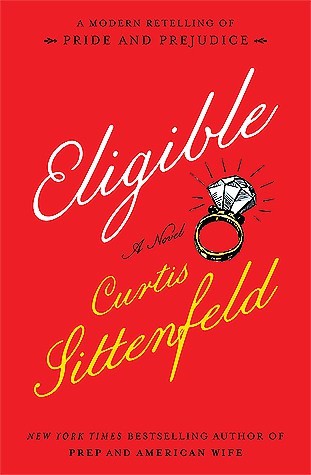
This version of the Bennet family and Mr. Darcy is one that you have and haven’t met before: Liz is a magazine writer in her late thirties who, like her yoga instructor older sister, Jane, lives in New York City. When their father has a health scare, they return to their childhood home in Cincinnati to help and discover that the sprawling Tudor they grew up in is crumbling and the family is in disarray.
Youngest sisters Kitty and Lydia are too busy with their CrossFit workouts and Paleo diets to get jobs. Mary, the middle sister, is earning her third online master’s degree and barely leaves her room, except for those mysterious Tuesday-night outings she won’t discuss. And Mrs. Bennet has one thing on her mind: how to marry off her daughters, especially as Jane’s fortieth birthday fast approaches.
Enter Chip Bingley, a handsome new-in-town doctor who recently appeared on the juggernaut reality TV dating show Eligible. At a Fourth of July barbecue, Chip takes an immediate interest in Jane, but Chip’s friend, neurosurgeon Fitzwilliam Darcy, reveals himself to Liz to be much less charming. . . . And yet, first impressions can be deceiving.
PROSPECTIVE ADAPTATIONS
Prospective adaptations can stand alone. Their relevance does not depend upon prior knowledge of earlier texts.
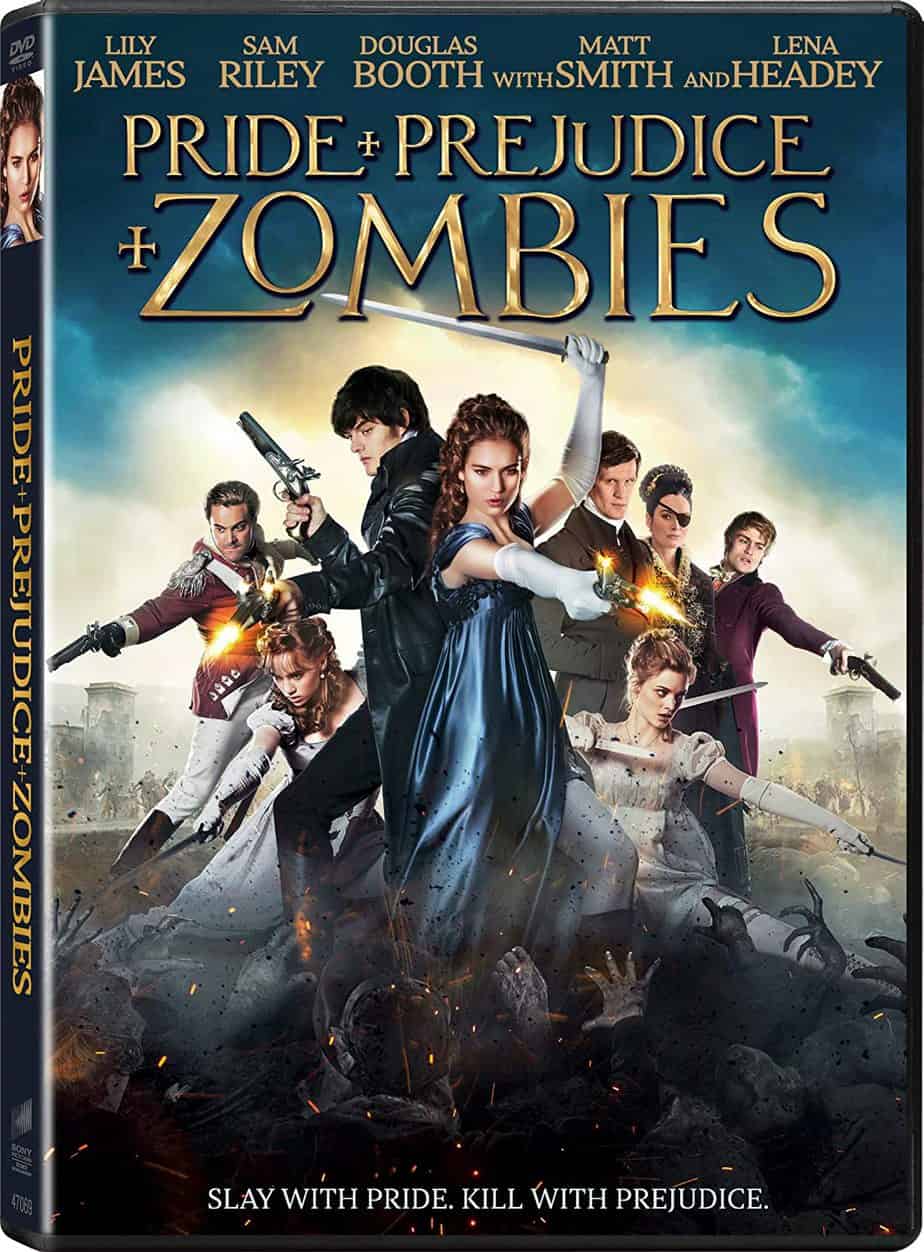
She’s twenty years old, which means she really should be getting off that shelf round about now. I mean, Jane Austen herself died at the age of 41, and was very ill for the two years before that. This wasn’t unusual, so Lizzie may only have about 17 years to source a fiancée, get married then produce and care for a brood of children. Early marriage isn’t an illogical way of thinking, but… To modern readers?
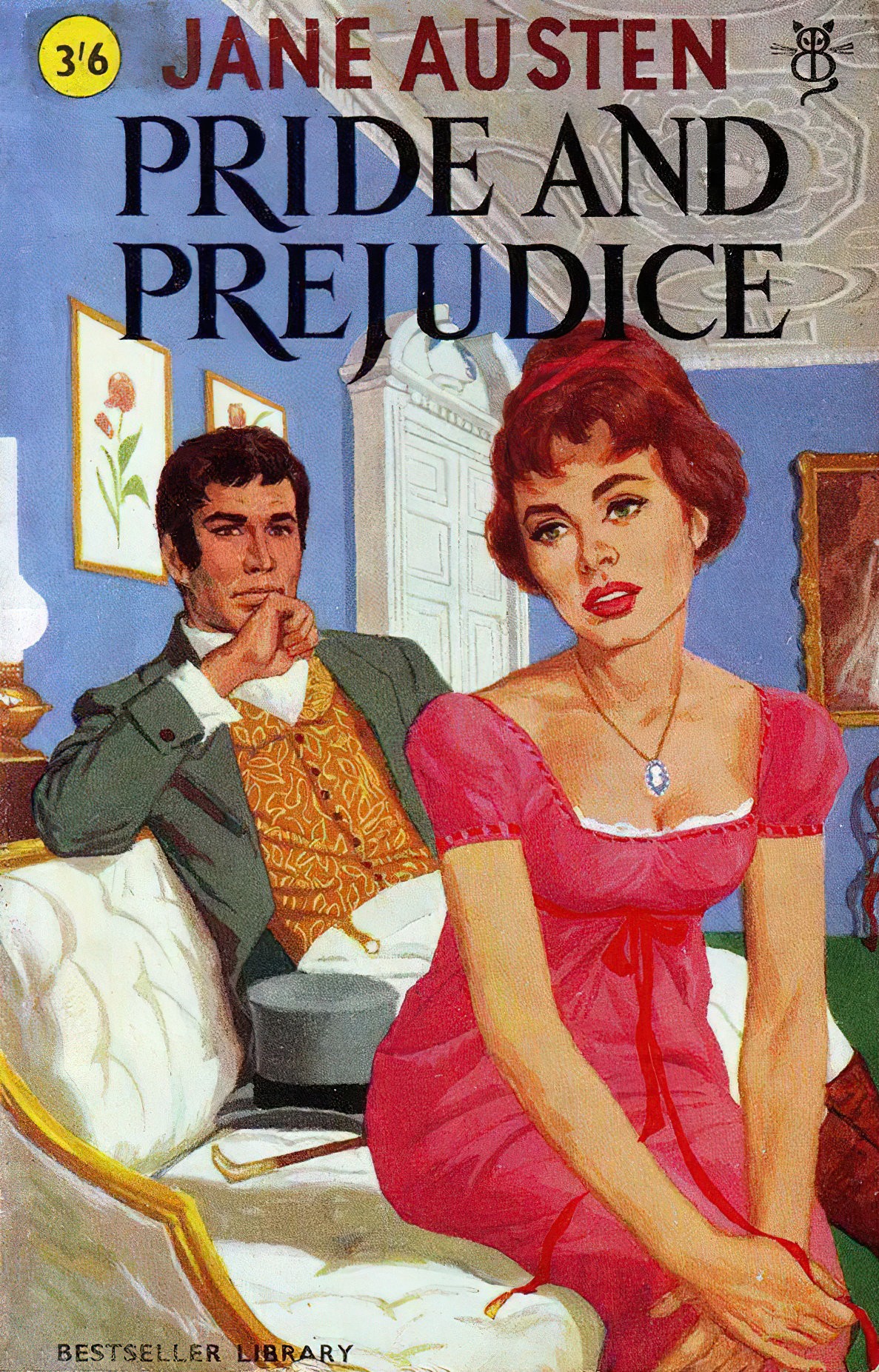
PRIDE AND PREJUDICE RESOURCES
Wendy Lee on Jane Austen’s “Pride and Prejudice”
Jane Austen’s novel Pride and Prejudice delights, charms and entrances reader since its anonymous publication in 1813. The Bennett sisters need to marry rich, for otherwise they’ll fall into poverty and social disgrace. I talked with one of the great Austen experts of our time, Professor Wendy Lee of New York University, who has published widely on Austen, including in Failures of Feeling: Insensibility and the Novel (Stanford UP).
New Books Network
PRIDE AND PREJUDICE, PART 1: CRASH COURSE LITERATURE #411
LIBERALS, CONSERVATIVES, AND PRIDE AND PREJUDICE, PART 2: CRASH COURSE LITERATURE #412
England in the Age of Austen
Jeremy Black’s new book on England in the Age of Austen, just published by Indiana University Press (2021), will be a treat for anyone who loves Jane – and who does not? – as well as anyone who is interested in her contexts. Black situates Austen’s work in its social, political, economic and religious cultures, showing how her youthful commitments to Jacobite politics evolved into a more mature appreciation of the strengths and weaknesses of late eighteenth- and early nineteenth-century England. Alert to the ironies of her own life and the lives of her characters, Austen wrote of the kind of world in which she wanted to live, balancing the disappointments of her own life and those of her characters with a dependency upon providence and an active commitment to preserve the best values of English society.
New Books Network
